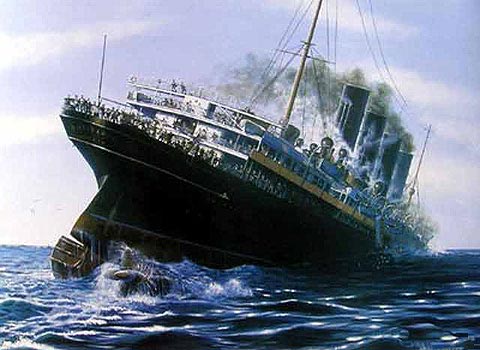Long-lasting disaster, people are selfless?
Revisiting the record of the two sinking incidents of the Titanic and Lusitania, scientists at the University of Queensland (Australia) concluded: the length of the disaster that determines whether people behave selfish or altruistic in that situation.
The Titanic sank when it hit an iceberg (1912), while Lusitania was hit by a German U-boat torpedo (1915).
In the process of analyzing records, scientists discovered, the ratio of sex, age, social class . among passengers on both ships is quite uniform. However, this rate after the disaster is not so.
While passengers of Titanic survived 14.8% of children, 53% of women, the corresponding rate in Lusitania ships was 5.3% and 1.1%. The survivors of the Lusitania ship were mostly healthy young men and they used their stamina to make room on the lifeboat, contrary to what happened on the Titanic: male passengers sacrificed themselves to save them women and children.

U-boat torpedo boat Lusitania (Germany).Survivors are mostly healthy young people.
According to Professor Benno Torgle (University of Queensland), the key to the difference lies in the time of the disaster, the Titanic sank after 3 hours while Lusitania sank after only 18 minutes. 'When there is little time to process, instinct will govern the action. When there is more time, social norms will play a major role in acting , 'explains Professor Torgle.
Ed Kamuda, President of the Titanic History Society, supports the conclusions of researchers at the University of Queensland.
However, psychologist Daniel Kruger, University of Michigan (USA) said that the behavior of the crowd depends greatly on the mentality of the commander, which in these two cases is the captain.
He cited, in the case of aircraft forced to land on the Hudson River in January 2009, thanks to the calm of Captain Chesley B. Sullenberger, passengers prioritized women and children as the first. Get out of the plane sinking into the river.
- Mysterious long legs
- The noodles are 'full long'
- The secret to help the ice cream to not melt
- Crow is a tough, long-lasting species
- Disaster disaster
- Close to the horrific earthquake in Ecuador that killed 246 people
- Material does not create long-term happiness
- The mysterious sounds of fish in the ocean
- Meeting disaster, why many people stand dead?
- Laughter makes people more likely to spend money
- How to keep fresh gladiolus flowers long during Tet holidays
- Situation of people in Himalayan earthquakes
 'Fine laughs' - Scary and painful torture in ancient times
'Fine laughs' - Scary and painful torture in ancient times The sequence of numbers 142857 of the Egyptian pyramids is known as the strangest number in the world - Why?
The sequence of numbers 142857 of the Egyptian pyramids is known as the strangest number in the world - Why? History of the iron
History of the iron What is alum?
What is alum?